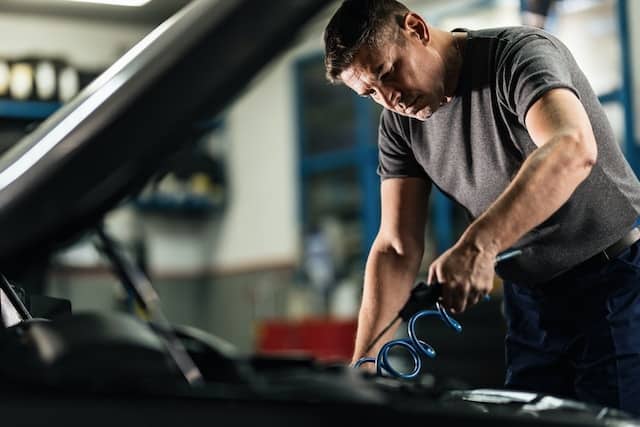
“Why does my car slow down then speed up?” This question can be puzzling and stressful for many car owners. The seemingly random fluctuation in your vehicle’s speed may be due to various factors, including transmission problems, faulty throttle position sensor, worn-out spark plugs, or fuel delivery issues. This article aims to demystify the causes, provide helpful insights to diagnose the issue, and suggest reliable fixes to ensure you’re back on the road safely and smoothly.
Why Does My Car Slow Down Then Speed Up? Common Causes
Transmission Problems
One common reason for your car’s erratic speed changes could be a problem with your transmission. This could include issues with the fluid, gears, or torque converter, which play pivotal roles in maintaining consistent vehicle speed.
Faulty Throttle Position Sensor
This sensor tells the car’s computer how much gas is needed, and when it malfunctions, it could cause speed fluctuations.
Worn-out Spark Plugs
Over time, spark plugs can wear out, reducing the car’s efficiency and causing inconsistent speeds.
Fuel Delivery Issues
Problems with the fuel system, such as a clogged fuel filter or a malfunctioning fuel pump, can cause inconsistent fuel delivery, resulting in a car that slows down and speeds up unpredictably.
Why Does My Car Slow Down Then Speed Up? Diagnosis and Fixes

Understanding the root cause of your car’s speed fluctuations can help guide the appropriate fixes.
Transmission Problems
Regular transmission maintenance, including proper fluid changes, can prevent transmission issues. If problems persist, consult a mechanic for a possible transmission repair or replacement.
Faulty Throttle Position Sensor
An error code scanner can help diagnose a faulty throttle position sensor. A mechanic can replace the malfunctioning sensor, restoring your vehicle’s normal speed regulation.
Worn-out Spark Plugs
Regular tune-ups and spark plug replacements can solve this issue, improving your vehicle’s performance and speed consistency.
Fuel Delivery Issues
Regular maintenance, including changing the fuel filter and checking the fuel pump, can prevent issues with the fuel delivery. A professional mechanic can inspect and repair these components if you suspect a problem.
Cost Estimates for Repairing Common Causes of Car Speed Fluctuation
Transmission Problems
The cost to fix transmission problems can vary widely, depending on the specific issue and your vehicle’s make and model. Simple fluid changes can cost around $100 to $200. However, for serious transmission issues, such as a complete replacement, you might be looking at a cost range from $1,800 to $3,500.
Faulty Throttle Position Sensor
Replacing a faulty throttle position sensor is typically a less expensive fix. Depending on your vehicle’s specifics and local labor rates, you can expect to pay between $150 and $300 for a throttle position sensor replacement.
Worn-Out Spark Plugs
Spark plug replacement is one of the most affordable fixes for speed fluctuation issues. Typically, the cost can range from $40 to $150, including parts and labor. However, the price can rise if your vehicle requires specialty plugs or if accessibility is a problem.
Fuel Delivery Issues
Fuel delivery problems may range in cost. A fuel filter replacement can cost between $50 and $200, including labor. If the fuel pump needs to be replaced, you’re looking at a higher cost, typically ranging from $600 to $1,000, including parts and labor.
A car that unpredictably slows down and then speeds up can be a source of stress for any driver. However, understanding the potential causes—such as transmission issues, a faulty throttle position sensor, worn-out spark plugs, or fuel delivery problems—can lead you to the appropriate fixes. Regular vehicle maintenance and prompt attention to any issues that arise can help keep your car running smoothly and reliably, giving you peace of mind on the road.
Why Does My Car Slow Down Then Speed Up? FAQs

Q: What are the common causes for a car slowing down and then speeding up unpredictably?
A: The common causes can be transmission problems, a faulty throttle position sensor, worn-out spark plugs, or fuel delivery issues.
Q: How can transmission problems affect my car’s speed?
A: Problems with the fluid, gears, or torque converter in your transmission system can disrupt the consistent movement of your vehicle, causing it to slow down and speed up unpredictably.
Q: What is the role of a throttle position sensor in my car?
A: A throttle position sensor informs the car’s computer about the gas pedal’s position, which determines how much fuel is needed. A faulty sensor can lead to inconsistent speed.
Q: How does a worn-out spark plug affect the speed of my car?
A: Worn-out spark plugs can reduce your car’s efficiency, leading to fluctuations in speed.
Q: What kind of fuel delivery issues can cause my car to slow down then speed up?
A: Problems with the fuel system, such as a clogged fuel filter or a malfunctioning fuel pump, can result in inconsistent fuel delivery, which may cause erratic speed changes.
Q: How much can I expect to pay to fix transmission problems?
A: Costs can vary, from around $100 to $200 for a simple fluid change, up to $1,800 to $3,500 for a complete transmission replacement.
Q: What is the estimated cost for replacing a faulty throttle position sensor?
A: The cost for replacing a throttle position sensor typically ranges from $150 to $300.
Q: How much does it cost to replace worn-out spark plugs?
A: Replacing spark plugs is usually affordable, ranging from $40 to $200.
Q: What are the cost estimates for fixing fuel delivery issues?
A: A fuel filter replacement can cost between $50 and $200, while a fuel pump replacement can range from $600 to $1,000.
Q: Can regular maintenance prevent my car from slowing down and then speeding up?
A: Yes, regular maintenance can help detect and prevent many issues that cause erratic speed changes, often saving you from more expensive repairs in the future.


